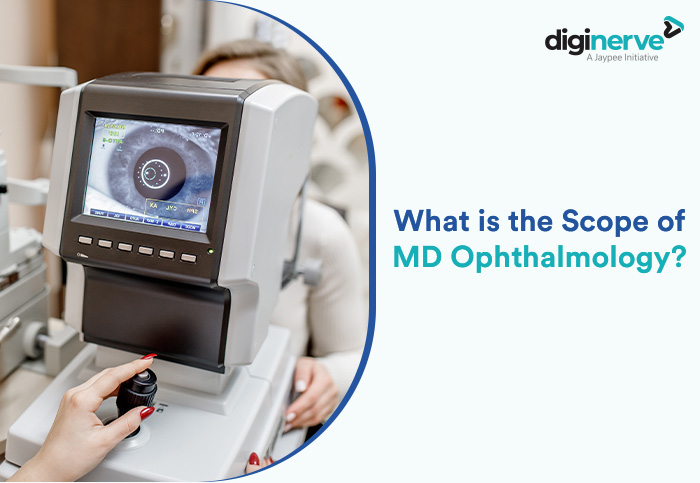After completing MD Ophthalmology, a post graduate student can explore a number of career opportunities. At the time of completion of the post-graduation degree, a medical student acquires extensive knowledge of theoretical aspects, and also gains adequate experience from real life medical scenarios. Ophthalmology is the branch of science that deals with one of the sensory organs of the human body- the eyes. During post graduation specialization in Ophthalmology, a student updates themselves with up-to-date knowledge of anatomy and physiology of eyes, functions of muscles and fluids of the eye, and eye-related diseases and treatments. Gaining experience from an internship and postings equips a medical student to choose the best specialty that suits his or her passion, knowledge, and skills.
There is a lot of
scope for the MD Ophthalmologist. They can choose any of the following career
prospect:
- Clinical Practice: An ophthalmology post graduate student can choose to be at the forefront of the healthcare system and be actively involved in patient service. Private clinics, private and public hospitals, and so on—these are institutions that offer an ophthalmologist an unparalleled opportunity to serve humanity. An ophthalmologist, therefore, can treat eye conditions, perform surgeries, and offer follow-up care after an eye surgery.
- Academics: MD ophthalmologists can join medical schools, colleges and universities to impart education to students. An academic career as a professor is a highly respected and profitable profession. Medical students, residents, researchers and practising doctors often seek expert advice or attend lectures on a certain concept of the eye. A seasoned ophthalmologist professor can give them expert advice. There are premium learning platforms too which offer ophthalmology post graduate courses. An MD ophthalmologist can also join such platforms as a faculty member or a faculty head.
- Research: Ophthalmologists who choose to be researchers must have a high level of patience as well as extensive knowledge of parts of the eye, including the chemical condition. N. Venkatesh Prajna, an eminent ophthalmologist is associated with one of the most renowned online medical learning platforms and guide the young ophthalmologist in mastering the subject. Ophthalmology is a branch of science where there are still too many facts that are unknown and unexplained. Ophthalmologists are associated with intensive eye research in every part of the world.
- Public health: Public health is a major concern in developing nations like India. The Government of India rolls out healthcare programmes and implements them through different government or semi government agencies. An ophthalmologist can join such organizations and hold various positions within the healthcare system. Some of the common healthcare activities are prevention of blindness, screening for eye diseases, and finally, improved access to eye care. An ophthalmologist can also get directly associated with government agencies and regulatory bodies like – CDC (Center for Disease Control and Prevention), NIH (National Institute of Health), and even international healthcare agencies that work closely with the Government of India, like the WHO (World Health Organization), and UNICEF (United Nations International Children's Emergency Fund).
- Entrepreneurship: An ophthalmologist can put his or her pioneering spirit into action and become an entrepreneur. Some entrepreneurship ideas include starting one’s own clinic or hospital, starting a new business, providing specialized eye care services, collaborating with others or developing new care techniques, products or technologies. They can also dedicate their knowledge to providing full time or part time consulting services. For instance, one can take the case study of Aravind Eye Care Hospital. This hospital has successfully created a significant impact on the lives of hundreds and thousands of patients with quality eye care services.
A good ophthalmology
post-graduation course will help you take your career to heights. The gold
standard faculty who design and teach these courses guide students in the right
direction to success. A reason why medical students opt for an MD in
ophthalmology is the fact that ophthalmology is one of the highest paying
specialties. With advanced skills, good eye and hand coordination, and
excellent vision – one can become a top ophthalmologist in India. Pursuing
higher studies in ophthalmology is also another option. A diploma in
ophthalmology, doctoral courses, fellowship programs, and super specialty
courses in ophthalmology are a few academic lines that medical aspirants can choose
to pursue. If you have completed your post-graduation in ophthalmology, you can
consider the above mentioned options. If you wish, you can discuss these with
your peers and faculties too before taking a decision.

Comments
Post a Comment